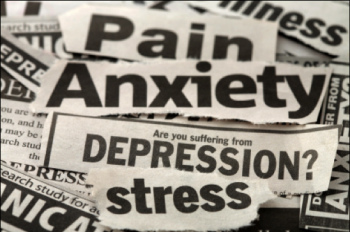By Katherine Gibson (The Cascade) – Email
Print Edition: Online only
Two sessions into her UFV counselling experience, Gabriella has already learned how to effectively use relaxation breathing techniques and pinpoint self-defeating thought patterns. In her third session, Gabriella builds upon these skills, learning how to use two-minute meditative sessions to better cope with feelings of anxiety.
After her last counselling session, Gabriella began casually seeing a guy. The connection between the two was short-lived. However, Gabriella’s experiences during this relationship revealed feelings and thoughts she had previously been masking.
“I met this guy who was amazing and then all of a sudden I got a random text saying, ‘I’m too busy, we shouldn’t hang out anymore.’ So I went from getting out of this big relationship, taking it slow, and seeing how life goes to this amazing guy who showed up,” Gabriella explains.
“This session was about dealing with this situation, because I could relate it to feelings that have happened to me before – that idea of rejection. What we tend to do is hide those [feelings],” she continues. “You mask them by hanging out with somebody else, or texting your friends like, ‘I need to talk to someone’ to get your mind off it.”
During her session, the counsellor explained to Gabriella the importance of fully acknowledging and recognizing the effects of masking upsetting emotions.
“[The counsellor] told me that if you’re not recognizing what’s happening, you’re just constantly putting plaster over the wound.’ So [they] got me to spend two minutes just processing how I felt,” she says. “Just having a timed one or two minutes feels different; it feels a lot longer when you’re trying to process this stuff.”
For Gabriella, the two minutes spent reflecting on her brief relationship allowed her to more fully understand the logic behind her decision, as well as feelings that underpinned her choice.
“I just sat there for two minutes, and [the counsellor] told me to really feel what I was feeling. So I sat and processed the rejection. It stemmed up a lot of other stuff for me too, the recurring things that I deal with – it’s being alone,” she notes.
“That’s something that we all struggle with sometimes. And in my position, I don’t really have a lot of freedom in my living situation. I share a room with someone, so I don’t have my own space,” Gabriella goes on. “So it was kind of nice to be with this guy. I could hang out with him, but still have ‘me’ time. It was like a sanctuary. And I know it was just a burst of nothing, but those few days were awesome.”
Beyond the actual relationship, for Gabriella it was reflecting on what losing this connection meant for her that had the most revealing impact.
“It was seeing what I could have, and then having that taken away from me that really exposed what the underlying issue was. I feel a little bit alone. There’s no ‘me’ space, and so I really focused on [understanding] that.”
The counsellor explained to Gabriella that through the use of two-minute meditations, over time a healthy barrier will build, giving her the ability to keep the negative emotions from so strongly impacting her life – a fact Gabriella connected with.
“You’re there thinking about it, letting your thoughts go there. If you’re feeling sad, feel sad. The more you do that, the more you’ll be able to deal with it,” she says. “You’re actually building up a barrier towards those feelings – but a healthy barrier because you’re acknowledging, rather than just masking them.”
Being a busy student herself, Gabriella appreciates that quick exercises, such as the meditation, may be more appealing to other students at UFV, when compared to more time-consuming exercises like the worksheets.
“When you’re writing things out, it’s great because it’s on paper, but sometimes we don’t have the time. This is something that you can just slot in,” Gabriella notes. “If you’re doing the relaxation breathing anyways, you can just do this too. Just sit there, get comfortable, breathe, put some warm socks on, and feel your feelings – that’s all this is.”
Despite the fact that she has only been going to UFV’s counsellors for three weeks, Gabriella can already see a shift in the way she deals with her anxiety.
“I’m so much more aware of where I am. I thought I was pretty self-aware before, but all of a sudden a Pandora’s Box opened, and I realized that there’s actually a lot of stuff I have to deal with,” she says. “There are times when I still will say [to myself], ‘You’re so bad at this’ or, ‘you deserve this pain’ or, ‘you’re a terrible person,’ but now I can stop and recognise that … I shouldn’t be saying those things.’ Because they aren’t true.”
The positive influence that counselling has had in Gabriella’s life has led her to encourage more of UFV’s student population to go and visit the counselling staff on campus.
“Going to see the counsellor is a thing that brings out a lot of stuff that you don’t realize you have. I would say these terrible things to myself. You just don’t realize sometimes that you’re doing it, and how harmful it actually is – no one deserves to do that,” she says. “So going to these meetings and having someone professional to bounce these ideas off, and give you pointers on how to deal with things is great – I don’t think anyone should turn that away.
“We always have to deal with things and we are vulnerable people,” Gabriella concludes. “Every month is different; every day of your life is different; so why not go to [counselling]. It’s free and it’s there to help students.”


